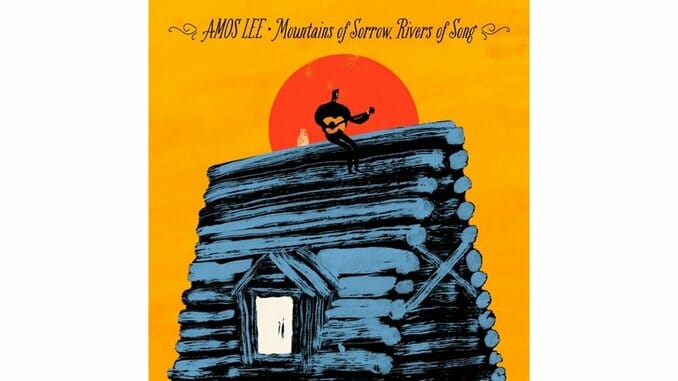
With his dusty voice and populist Americana, more real and current than the more retro-leaning members of the oeuvre, Amos Lee straddles the real estate staked out by Levon Helm, Little Feat and John Prine. In his songs, wonder isn’t wide-eyed, but knowing—and that makes the emotional charge more resonant.
His elegiac title track, sweeping dignity in the face of how hard life and respiteful death can be, finds Lee tangling his earthy tenor with Patty Griffin’s wire-and-sky soprano for a plainspoken tribute to those who make it work by their own two hands, confessing as a funeral procession goes by: “And I have a cabin of solitude/ I built it with my own hands, it’s quite crude/ Ain’t much to it, this I know/ But I won’t leave too much behind here when I go/ I’ll be seeking my fortunes, carryin’ on/ Past the mountains of sorry and rivers of song…”
That self-reliance is a potent theme. The techno-shuffling “Loretta,” with plenty of room for the Philadelphia native’s midrange to twist into soulful drifts, witnesses to a self-possessed woman who knows respect starts with her own fine self. The homage is equally reverential and desirous, and it works.
Jay Joyce, recently striking success with country progressive Eric Church, isn’t afraid of Lee’s funkier side. He takes the singer/songwriter into a tangy bit of horns, steamy female singers and clavinet to rave like a more wide-open Lenny Kravitz on “The Man Who Wants You” and the atmospheric “Indonesia,” where Lee’s ether-like tenor poses the yearning “When will I be free…” as some kind of homing pigeon of the heart.
For all its R&B undertow, gris-gris glory and soul shuffles, the Mountain’s essence is the acoustic-grounded, folk and country excavations. Whether it’s the gently finger-picked “Dresser Drawer,” with room for the desolation of its post-busted marriage lament, or the Guy Clark-worthy sweeping Texas meditation on progress and its price “Johnson Blvd,” featuring Willie Nelson vet Mickey Raphael’s plangent harmonica, Lee makes sorrow shimmer.
That ache gets embroidered by Nashville’s very finest—dobroist Jerry Douglas, mandolinist Jed Hughes and a silvery vocal from Alison Krauss—on “Chill In The Air,” another song about trying to break the ties of a love that’s gone, but not quite releasing the abandoned. Like Jackson Browne for another generation, Lee understands the staining traces of love—drawing on small details like a woman’s breath falling softly on his chest while they slept.
Spending his career exploring the American songbook’s capacity to hold his emotional tides, Amos Lee distills his essence. Ranging from old-timey to reverential, soul to Appalachian, Mountain stands utterly his.